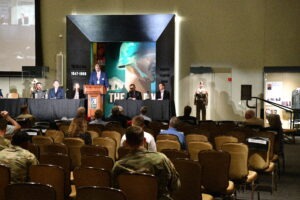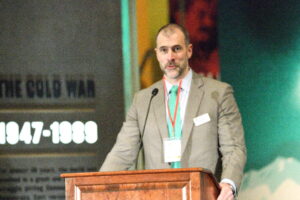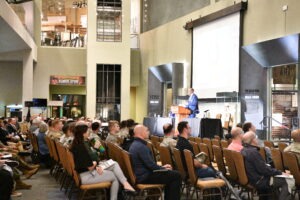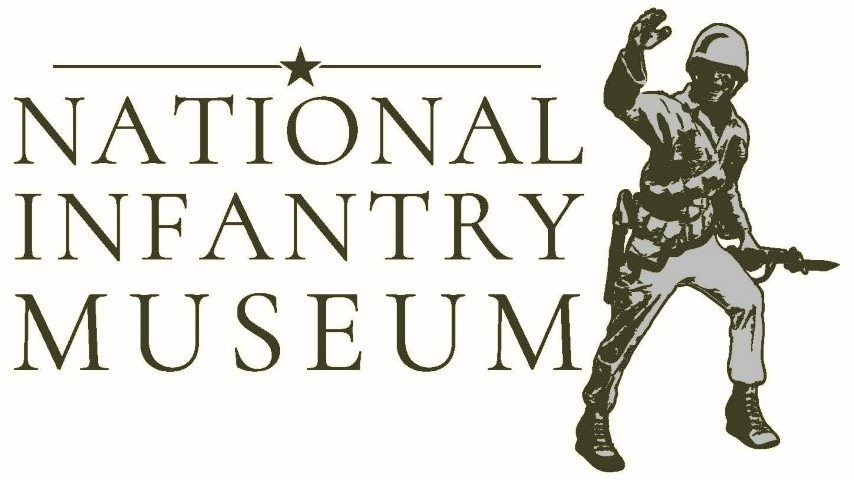 On March 10 & 11, 2023, The National Infantry Museum & Columbus State University hosted a public symposium to examine the legacy of Operation Iraqi Freedom on U.S. citizens, Middle Eastern countries like Iraq, as well as individuals’ physical, medical and mental health.
On March 10 & 11, 2023, The National Infantry Museum & Columbus State University hosted a public symposium to examine the legacy of Operation Iraqi Freedom on U.S. citizens, Middle Eastern countries like Iraq, as well as individuals’ physical, medical and mental health.
“The Iraq War: A 20-Year Retrospective Symposium” was a free event, and open to the public. The symposium received funding in part by the Hallock Endowment for Military History at Columbus State University and featured over 30 speakers and panelists.
The Iraq Invasion Symposium panelists discussed numerous issues including lessons learned from the war, modern warfare, psychology of the soldiers, and much more.
Guest speakers included the following:
- Col. Liam Collins, Ph.D. (U.S. Army, ret.), founding director of the Modern War Institute at the U.S. Military Academy at West Point, who will present the keynote address on Friday, March 10
- Gen. Peter Chiarelli (U.S. Army, ret.), the U.S. Army’s 32nd vice chief of staff from 2008 to 2012, past commander of the Multi-National Corps-Iraq under Gen. George W. Casey Jr., and senior military assistant to U.S. Secretary of Defense Robert M. Gates from March 2007 to August 2008 will present the keynote at the ticketed keynote dinner on Friday, March 10
- Catherine Lutz, Ph.D., the Thomas J. Watson Jr. Family Professor of International Studies and co-founder and co-director of Brown University’s Costs of War Project, who will present the keynote address on Saturday, March 11
- Col. Scott Mueller (U.S. Army), director of the U.S. Army Center For Lessons Learned, Combined Arms Center at Fort Leavenworth, who will participate in the “Lessons and Legacies” panel discussion on Saturday, March 11
- Gen. David Perkins (U.S. Army, ret.), 15th commander of the U.S. Army Training and Doctrine Command (TRADOC), who will participate in the Friday, March 10 panel on “Assessing U.S. Military Strategy in Iraq”
 The 2003 invasion of Iraq by the United States was a watershed moment in international relations and its reverberations have been felt around the world for more than two decades. Of particular focus are the effects – both positively and negatively- on those who served in or were impacted by the conflict.
The 2003 invasion of Iraq by the United States was a watershed moment in international relations and its reverberations have been felt around the world for more than two decades. Of particular focus are the effects – both positively and negatively- on those who served in or were impacted by the conflict.
Spearheaded by former President George W. Bush’s administration amid allegations that Iraqi leader Saddam Hussein maintained weapons of mass destruction and administrated international terrorism.
For the last 20 years, America dealt massive damage to the physical structures and damaged much of the infrastructure throughout Iraq. This type of response was needed to defeat Saddam Hussein and his reign of terror. Yet, many repercussions still affect Iraqi civilians and some Americans opinions on the topic.
 Symposium speakers highlighted the effect of war on social structures. Panelists also looked at the criticism received from disenchanted Americans. Questions were answered about the need for substantial international aid to make up for the wars total damage done over two decades.
Symposium speakers highlighted the effect of war on social structures. Panelists also looked at the criticism received from disenchanted Americans. Questions were answered about the need for substantial international aid to make up for the wars total damage done over two decades.
The war and invasion saw over 1 million U.S troops serve abroad alongside intensive mobilization from National Guard and Reserve forces.






